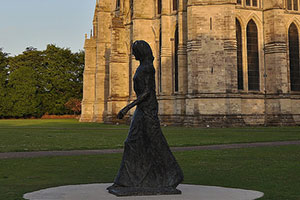Whisperings of angels, rule-breaking and unconventional women
Liz Stuart, 22 December 2019
Romans 1: 1–7; Matthew 1: 18–25
‘Learn and obey the rules well, so that you can break them properly’, so says the Dalai Lama.
Joseph is a shadowy figure in the Christian imagination and he plays rather a bit part on our re-enactments of the nativity story. But St Matthew makes Joseph the star (if you will excuse the pun) of Jesus’ birth.
Now, the nativity narratives in Matthew and Luke are gospels in miniature; like the prologue of a play, they rehearse and summarise the main themes of the gospel. So, what are we to make of the fact that Mathew makes no mention of Joseph later in gospel? The answer lies in the description of Joseph here as a ‘righteous man’. In the Sermon on the Mount Jesus will tell his disciples, ‘Unless your righteousness exceeds that of the scribes and Pharisees, you will never enter the kingdom of heaven’. What does that mean? What does that look like? It looks like Joseph, the righteous man.
The Torah required a man who found something objectionable with the woman to whom he was contracted to divorce her. This is what Joseph intended to do because the evidence suggested that Mary had been unfaithful to him. And then, like the patriarch for whom he was named, Joseph has a dream in which he was visited by a malak Yahweh, an angel of the Lord. So, the first thing we learn about righteousness is that it involves being open to the possibility of meeting angels and recognising, therefore, that God is alive and still has things to tell us. Then the angel tells Joseph that the child is from the Holy Spirit, who will save his people from their sins, and therefore Joseph must not be afraid to take Mary as his wife. This tells us that being righteous means recognising that God sometimes works outside the rules we write for him, and that it is more important to follow God than those rules, no matter what the consequences.
The angel addresses Joseph as ‘Son of David’, which reminds us of the genealogy with which Matthew begins his gospel. That genealogy includes four women. Ruth the Moabite (a Gentile); Bathsheba, whose husband David had killed so that he could have her; Rahab the prostitute; and Tamar, who pretended to be a prostitute. I don’t know what your image of Mary the mother of Jesus is – meek and mild perhaps? – but that is not the image Matthew conjures up. He suggests through the genealogy that she stands in a tradition of unconventional and irregular women.
My favourite image of Mary is Elizabeth Frink’s Walking Madonna, which is outside Salisbury Cathedral: purposefully she strides away from the Church. Matthew’s Joseph is not asked to marry a meek and mild Mary but an unconventional, irregular, disconcerting Mary, more like Mary as portrayed by one of my sister’s foster children, who during the nativity play told Joseph where to go using very colourful language and decked one of the Magi. Perhaps being righteous involves honouring the fact that God tends to use nonconformist women to further his plans? We might think on that when we are challenged by Greta Thunberg to change our way of living.
In Christian folklore Joseph is often portrayed as an older person – older than Mary, certainly. I wonder if any of you have read the Franciscan theologian Richard Rohr’s book Falling Upward. His thesis is that the first half of our life is all about building our egos, all about establishing our identity and security. The second half of life begins to occur when all this breaks down and we slowly and painfully find our true selves in God. The first half of life, Rohr says, is all about rules; the second half of life is all about relationships. The angel pushed Joseph from a first-half to a second-half-of-life perspective. The angel told him not to be afraid of moving in his understanding from a God of rules to a God of relationships.
I am frequently struck when I read the Old Testament by how often the narrative moves on through the breaking of the rules contained in the Law. We are dealing with a God who is uncontainable and untameable and profoundly subversive.
We are dealing with a God who is uncontainable and untameable and profoundly subversive.
Matthew’s Joseph teaches us how to be righteous: be open to the whisperings of angels, be prepared for God to act outside the instruction manuals, respect those women of valour who defy convention, do not be afraid to value relationships over rules, be a second-half-of-life person and, through all this, bring to birth the Christ child. But he also reminds us through his lineage and story that God loves a mess and messy people with complex and runaway lives and to them – to us – he pleads, ‘Here I am. Enflesh me. Give birth to me’ (Madeleine L’Engle, Walking on Water: Reflections on Faith and Art New York: Penguin Random House, 1980, p. 186).

